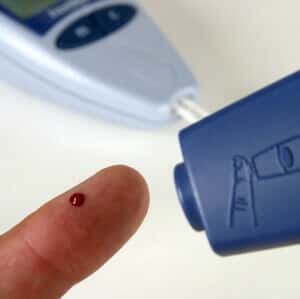
Type 2 diabetes has become very common. Consequently, many people must pay close attention to their blood sugar. What influences blood glucose levels? There are, of course, medications that may be necessary. However, there are individuals who would prefer a natural approach. Could you control your blood sugar with diet and dietary supplements along with exercise?
How to Control Your Blood Sugar Naturally:
Q. My husband is controlling his blood sugar with supplements, diet and exercise. The supplements work for a while, but then his numbers go up in spite of a good diet. Do you have any natural suggestions that could help?
A. A low-carb diet and regular exercise can help control blood sugar, especially if these strategies lead to weight loss (Sato et al, Clinical Nutrition, Aug. 2017; Meng et al, Diabetes Research and Clinical Practice, Sep. 2017). Many people find it difficult to maintain such a diet over the long term, however. In addition, its benefits fade unless it is actively followed (Sato et al, PLoS One, Dec. 4, 2017).
A systematic review of 20 randomized controlled trials lasting at least six months showed that many different dietary approaches could be helpful if followed conscientiously (Ajala, English & Pinkney, American Journal of Clinical Nutrition, March 2013).
According to the authors:
“Low-carbohydrate, low-GI [glycemic index], Mediterranean, and high-protein diets are effective in improving various markers of cardiovascular risk in people with diabetes and should be considered in the overall strategy of diabetes management.”
Exercise:
Regular exercise can help with blood sugar control as well as with weight management. Interrupting long bouts of sitting by getting up and walking around every half hour or so helps bring blood glucose down (McCarthy et al, Medicine and Science in Sports and Exercise, Nov. 2017). This approach seems especially helpful for men who aren’t very fit. Overall, it appears that a single exercise session can have immediate metabolic benefits (Asano et al, World Journal of Diabetes, Oct. 15, 2014).
One group of Dutch scientists argues that providing a systematic framework to treat people with type 2 diabetes through
“personalized diagnosis and diet, physical activity and stress management, self-empowerment, motivation, participation and health literacy, all facilitated by blended care and ehealth”
is (or should be) the new paradigm (van Ommen et al, Frontiers in Endocrinology, Jan. 22, 2018).
Dietary Supplements to Control Your Blood Sugar:
Taking a water-extracted cinnamon product may help control your blood sugar. However, this approach remains controversial (Costello et al, Journal of the Academy of Nutrition and Dietetics, Nov. 2016). Other dietary supplements that help people keep their blood sugar under control include fenugreek, nopal (Opuntia), psyllium and ginger (Ota & Ulrih, Frontiers in Pharmacology, online July 6, 2017).
One reader asked about fenugreek:
Q. I found a spice in my spice rack that I had never heard of and I had no instructions on how to use it. In researching fenugreek as a spice, I found that it is one of the most overlooked medicinal herbs.
It is used to lower cholesterol, control blood sugar, and increase lactation (for breastfeeding mothers). The only side effect I found is nausea if you take too much. What do you know about this herb?
A. Studies in animals and humans show that fenugreek can lower cholesterol and blood sugar. If people with diabetes take fenugreek, they should monitor their blood sugar to make sure it doesn’t fall too much.
Fenugreek seeds are rich in soluble fiber and can be used to treat constipation. At high doses, this herb can cause digestive distress.
We didn’t find any evidence that fenugreek could improve lactation, and The Natural Health Bible cautions pregnant and nursing women to avoid it.
Any tactics a person employs to control blood sugar require careful coordination with the physician. It makes sense to keep the doctor informed. In addition, certain supplements may interact with diabetes medicine. For example, cinnamon increases blood levels of pioglitazone (Actos) (Mamindla et al, Current Clinical Pharmacology, 2017).
Daily glucose monitoring is essential. For more details on these and other approaches we are sending you our Guide to Managing Diabetes.

